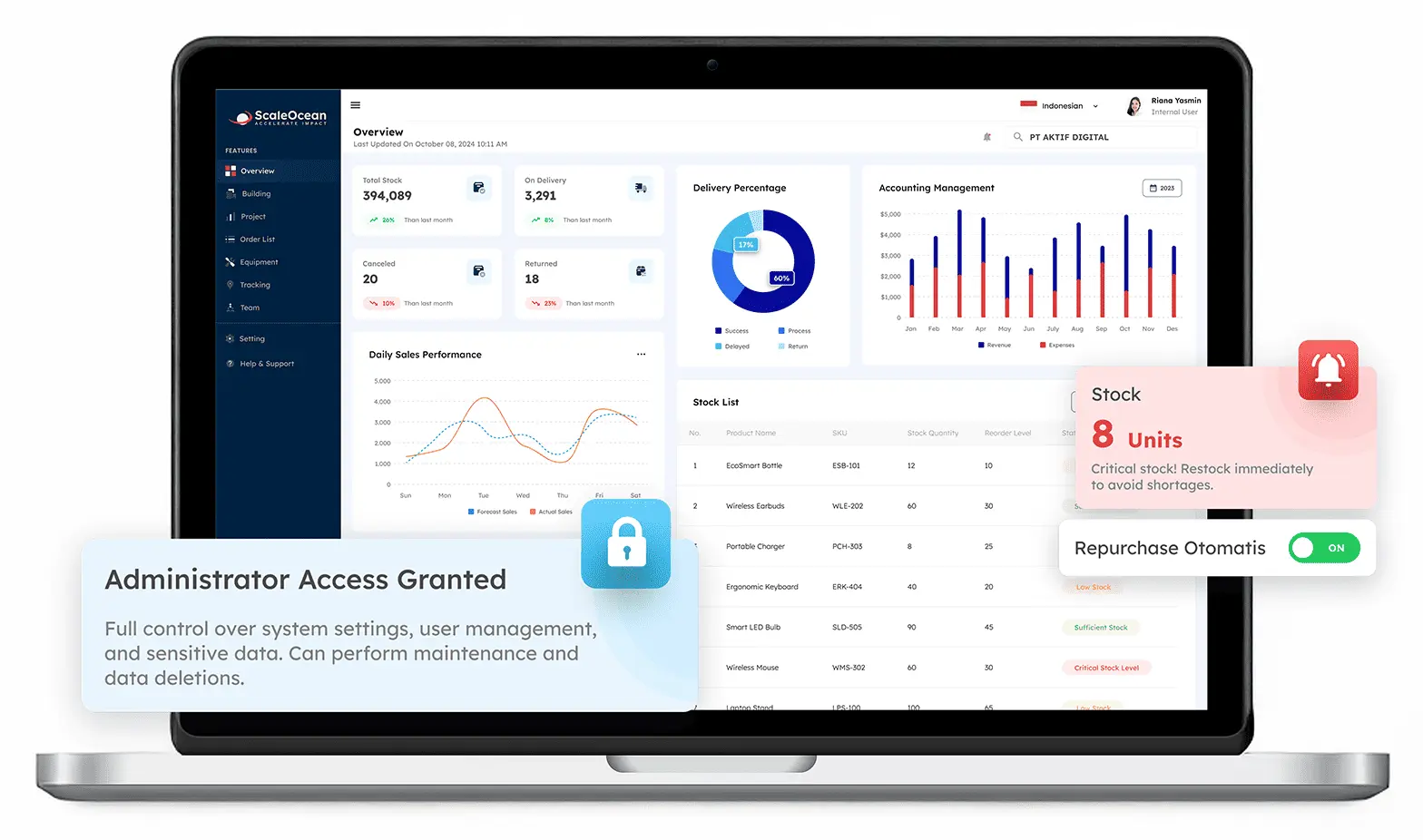Globalization, innovation, and rising customer demands are propelling Singapore’s economy forward at a rapid pace. In this dynamic market, ERP trends highlight how technology has become the core foundation for competitiveness.
TechSci Research valued the Singapore and Indonesia ERP Implementation Market at USD 949.11M in 2023, with 13.77% CAGR growth projected through 2029. ERP stands out as a game changer, unifying finance, operations, sales, and supply chain in one platform.
ERP is no longer just a tool but the core nervous system for modern businesses. It enables smarter decision-making and boosts productivity. By 2026 and beyond, ERP developments will reshape how Singaporean organizations operate, grow, and compete. This article explores these shifts to guide executives in staying ahead.
- Understanding the game-changing role of ERP is the first step for any Singaporean business looking to achieve sustainable growth and efficiency.
- ERP trends show that the future of ERP is driven by major shifts like AI, cloud adoption, hyper-personalization, and more, which are reshaping operational capabilities.
- Leverage new ERP trends by assessing needs, prioritizing ROI, and choosing a future-proof vendor for successful implementation.
- ScaleOcean’s AI-powered ERP offers the tools necessary to stay ahead, integrating these future-forward trends into a single, seamless platform.

Why ERP is a Game-Changer for Singaporean Businesses
In Singapore’s competitive economy, efficiency is essential. Enterprise Resource Planning (ERP) systems now serve as the backbone of businesses, integrating finance, HR, and supply chain. This unified approach creates a single source of truth, driving faster, more accurate decisions while supporting future trends in ERP.
ERP benefits both SMEs and large firms with automation, real-time visibility, and stronger reporting. Leaders can pivot quickly and scale effectively. The key characteristics of ERP systems focus on scalable integration, offering the structure and control businesses need for sustainable growth, with advanced enterprise management capabilities.
16 ERP Trends for Singapore’s Business in 2026 and Beyond
The ERP landscape is rapidly shifting from rigid systems to smarter, adaptable solutions that keep businesses competitive. These are major transformations, driven by AI, mobility, and emerging technologies, enabling greater efficiency and strategy. For Singaporean leaders, understanding these changes is vital to make future-ready investments. Here are the top ERP trends for 2026 & beyond:
1. AI-Driven Intelligence & Automation
Artificial Intelligence is no longer a buzzword because it’s a core feature in modern and intelligent ERP systems. AI automates routine tasks like data entry and invoicing, reducing human error and freeing employees to focus on strategic, high-value work that drives growth.
Beyond automation, AI also brings predictive analytics into ERP platforms through AI ERP integration. By analyzing historical data, the system can forecast demand, detect supply chain risks, and suggest pricing strategies. This empowers decision-makers to anticipate market shifts and gain a true competitive advantage.
2. Cloud-Native & Hybrid ERP
There has been a significant transition away from outdated on-premise ERP systems, and with good cause. Cloud-native ERPs offer flexibility, scalability, and accessibility, allowing organizations to work from anywhere without incurring the high costs of maintaining server infrastructure. This trend has accelerated as remote and hybrid work became the norm in Singapore.
However, it is not always necessary to go completely to the cloud or remain on-premises. Many firms use a hybrid model, keeping important functions in-house while shifting others to the cloud. This strikes a balance between security and flexibility, making one of the recommended ERP software in Singapore a strong choice for tailored solutions.
3. Hyper-Personalization & Enhanced User Experience (UX)
Old ERP systems were frequently cumbersome, complex, and difficult to use, resulting in low adoption across teams. Modern ERP platforms prioritize user experience, providing intuitive interfaces that seem as natural as consumer apps. This decreases training time while increasing the possibility of complete system adoption.
The emphasis on UX also extends to hyper-personalization, with dashboards, workflows, and reports tailored to each function. A sales manager can see data based on sales indicators, but a warehouse supervisor sees operational information. This customization enhances ERP systems’ usability and guarantees that every user gets the most out of them.
4. Composable & Integrated Ecosystems
The era of one-size-fits-all ERP is over, and businesses are turning to composable ERP for increased agility and flexibility. Companies can use APIs to integrate specialized apps for CRM, e-commerce, and finance, while keeping ERP as the central hub.
Understanding the various ERP modules is critical for creating a tailored ecosystem that meets corporate requirements. This method provides unified insights, streamlines procedures, and boosts overall productivity, ensuring that businesses remain adaptive in a changing market environment.
5. Proactive Cybersecurity & Compliance
Security is now a must-have for any ERP system, with platforms including encryption, multi-factor authentication, and real-time threat detection. These safeguards ensure resilience, protecting sensitive data from breaches and improving overall business continuity.
Compliance is also critical in Singapore, where ERPs facilitate PDPA and industry standards through data governance, audit trails, and automated reporting. Companies can avoid penalties, protect customer trust, and retain long-term confidence in their operations by implementing systems that enable stringent compliance.
6. Deep Industry-Specific Functionality
Generic ERP solutions frequently require extensive customization, which can be expensive and time-consuming. To address this, businesses are transitioning to industry-specific ERP, which includes pre-built features specialized for industries such as manufacturing, retail, professional services, and construction.
These solutions handle critical issues directly, such as shop floor control in manufacturing or POS integration in retail. Targeted systems provide a better fit, faster implementation, and quicker ROI compared to generic, heavily customized platforms.
7. Mobile-First ERP
Employees can now access crucial operations via smartphones or tablets, allowing them to complete duties such as approvals, stock checks, and sales tracking from anywhere. This mobility supports smooth operations and allows teams to remain productive without being restricted to physical locations or desktops.
Mobile apps tailored to specific requirements increase agility and operational efficiency. By streamlining daily activities and avoiding delays, these solutions assist firms in maintaining smooth processes and dramatically increasing overall productivity across multiple roles.
8. Real-Time Data & Advanced Analytics
Modern ERP systems provide real-time data via live dashboards and analytics, allowing leaders to monitor KPIs and respond rapidly. They highlight patterns and insights that are typically hidden in spreadsheets, transforming raw data into useful information for strategic decision-making.
Some platforms also incorporate grant management functions, which provide companies with better visibility into funding and spending. With these features, ERP moves beyond reporting to become a strategic instrument for operational efficiency and financial supervision.
9. Low-Code/No-Code Development Platforms
The advent of low-code/no-code (LCNC) platforms in ERP is revolutionizing customization by eliminating the need for expensive consultants or specialist IT teams. With simple drag-and-drop tools, even non-technical people can quickly design applications, automate procedures, and generate reports.
This democratization of development allows business users to gain authority while reducing IT responsibilities. As a result, ERP systems become more versatile and responsive to changing business requirements, allowing firms to innovate faster and grow more effectively.
10. Sustainability & Green ERP
Green ERP is becoming an essential tool for firms dealing with increased sustainability demands from both customers and regulators. According to ASEAN Briefing, Scope 3 emissions are now voluntary but are scheduled to become required beginning in 2026.
ERP systems enable firms to properly track energy consumption, carbon emissions, waste, and procurement ethics. These competencies promote ESG compliance, boost corporate reputation, and attract investment, making sustainability a key business strategy in Singapore and elsewhere.
11. LLM-powered assistance tools
LLMs are truly transforming ERP systems by offering smarter automation and support. These AI-driven tools provide real-time help with customer queries and inventory, streamlining daily tasks and making your workload much lighter.
Integrating LLMs with ERP platforms is a game-changer for decision-making. By analyzing data to provide smart insights, they help cut down on errors and empower your team to make fast, accurate, data-driven choices with confidence.
12. Integration of Blockchain technology
Blockchain is really taking off in ERP, making systems far more transparent and secure. By safely tracking transactions, it ensures data integrity and cuts fraud risks, giving businesses a platform they can truly rely on.
With its decentralized setup, blockchain offers real-time updates that keep data consistent. For supply chain or finance, this means smoother workflows, less manual work, and much better accountability for every transaction.
13. AI-driven conversational interfaces
Conversational AI is a huge trend in ERP systems, letting you interact with software using natural language. This simplifies tasks like data entry and reporting, making complex ERP processes feel much more intuitive and easy.
With chatbots and voice assistants, ERPs can now handle requests instantly, saving you time spent on menus. This technology makes systems way more user-friendly and efficient for both busy employees and business leaders.
14. Growing demand for hybrid IT setups
More businesses are embracing hybrid IT, mixing on-premise setups with cloud solutions. This trend drives ERP innovation as teams look for flexible, scalable tools that balance tight security with the cloud’s cost-efficiency.
Hybrid IT helps businesses optimize ERP systems by offering better flexibility. You can keep sensitive data on-premises while using the cloud for scalable, affordable modules, creating a customized approach to IT management.
15. Reporting on sustainability efforts
Sustainability reporting is becoming a vital part of modern ERPs, helping companies track their environmental impact. These systems include metrics that make it easy to monitor carbon footprints and resource use effectively.
With regulations growing, businesses are using ERPs to stay compliant. By integrating real-time environmental data, these systems help companies make smarter decisions and meet their global sustainability goals with ease.
16. Streamlined, user-friendly interfaces for enhanced focus
Modern ERPs are becoming leaner and more intuitive to help teams stay focused. These simple interfaces let employees find key info fast without distractions, boosting output and making training a breeze for new hires.
By turning complex features into easy-to-use dashboards, companies empower teams to focus on big tasks. ScaleOcean ERP offers these sleek interfaces to boost efficiency, making it the perfect choice for optimizing your workflows.

How to Leverage These ERP Trends for Your Business
Understanding ERP industry trends is important, but the true problem is putting them into action effectively. More than just software, success necessitates a strategy that integrates technology with goals, prepares the firm for change, and guarantees that each innovation has a significant impact. Let’s look at some key actions to ensure your investment in a modern ERP system pays off.
1. Assess Your Current Business Needs & Pain Points
Before entering into AI or low-code features, conduct a thorough review of your company’s requirements. Identify pain points, bottlenecks, and inefficiencies that waste important time and resources. This guarantees that you concentrate on real difficulties rather than chasing trends.
Engage cross-departmental teams to gain insights and develop explicit ERP system needs. Their opinion focuses on practical issues that must be addressed. With this strategy, your ERP investment addresses actual issues rather than adding unneeded complexity.
2. Prioritize Trends with the Highest ROI
Because not every trend has the same impact, firms should prioritize ERP advancements that provide the highest ROI. The idea is to match each trend to specific difficulties, ensuring that investments stay targeted and meaningful for long-term success.
Firms must measure benefits against implementation challenges when calculating total value. Remember that ERP price is determined by the whole value given, not just license fees. This viewpoint helps to drive better judgments and more sustainable technology adoption.
3. Choose a Scalable and Future-Proof ERP Vendor
Choosing a scalable, future-proof ERP vendor is a continuous investment, not a one-time purchase. Businesses should look for vendors who have demonstrated innovation and a clear roadmap that addresses changing ERP trends. This assures that the system will expand alongside the firm.
Expansion can include adding more users, entering new markets, or incorporating extra features. A thorough ERP comparison is required to select a vendor who can provide long-term value. The right partner promotes stability and long-term success.
4. Plan for Change Management and Employee Training
Honestly, one of the most common issues in a botched ERP implementation is a lack of user adoption. Even with superior technology, the team’s resistance or discomfort hampers success. Without user faith, the system’s claimed benefits would never be realized.
That is why a complete change management strategy is required for ERP adoption. It helps employees navigate transitions, decreases resistance, and fosters trust. With effective management, firms may maximize adoption and create actual outcomes.
Stay One Step Ahead with ScaleOcean’s AI-Powered ERP

To experience these benefits, ScaleOcean offers a free demo so enterprises can see the system in action. Businesses in Singapore can also leverage the CTC Grant to reduce adoption costs. For clarity, here is a summary of the main features of ScaleOcean software:
- Full Business Auto-Pilot: Automates your entire business operations with intelligent workflows tailored to each department.
- Real-Time Reports & Insights: Delivers instant analytics and real-time reports to support smarter, faster decisions.
- Fully Customizable & Flexible: Adapts to your unique workflows with customizable dashboards and smart configurations.
- Seamless Multi-Branch Integration: Connects all branches and departments in one unified ERP platform.
- 500+ Modular Solutions: offering over 500 industry-ready modules and 30,000+ features to scale with your business needs.
Conclusion
The progress of ERP reflects the major changes in today’s corporate environment. Companies in Singapore can no longer rely solely on transactional systems. Businesses increasingly seek sophisticated, integrated platforms that support AI, cloud, customization, and sustainability, fundamental shifts that will reshape how organizations compete and thrive.
To stay ahead, choose solutions that meet business demands and plan for future issues. ScaleOcean’s ERP software is precisely that: an AI-powered, scalable solution built to improve efficiency, resilience, and support long-term growth. With ScaleOcean as your partner, you receive not only technology but also a roadmap for long-term success.
FAQ:
1. What are the trends in ERP?
ERP trends today emphasize the rise of AI, cloud-based platforms, mobile-ready systems, and instant analytics. These elements evolve ERP into a strategic solution, enabling better decision-making, higher efficiency, and stronger competitiveness across industries in a digital-driven world.
2. What is the future of ERP?
The future of ERP will focus on AI, cloud-based solutions, and automation, enabling greater flexibility and scalability. ERPs will offer real-time data insights, improved user experiences, and industry-specific functionalities, with businesses adopting modular, cloud-native systems for better adaptability.
3. Will ERP be replaced by AI?
AI is not expected to replace ERP, so instead, it strengthens it. Integrated AI features in ERP systems reduce manual work, offer predictive insights, and improve accuracy. This makes ERP smarter, more responsive, and indispensable for managing modern businesses effectively.
4. What is the fastest-growing ERP system in the world?
Oracle NetSuite leads as the fastest-growing ERP system worldwide, recognized for its cloud-native design, scalability, and SME adoption. However, ScaleOcean’s ERP software offers a strong alternative, with unlimited users, flexible customization, and seamless integration, making it equally powerful for businesses pursuing digital transformation.










 PTE LTD..png)
.png)

.png)








.png)
.png)
















